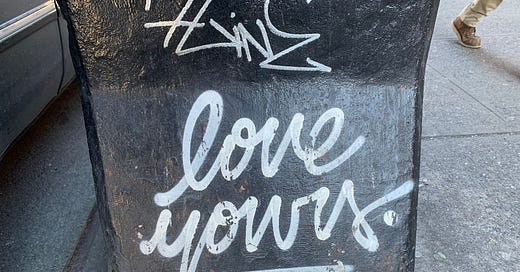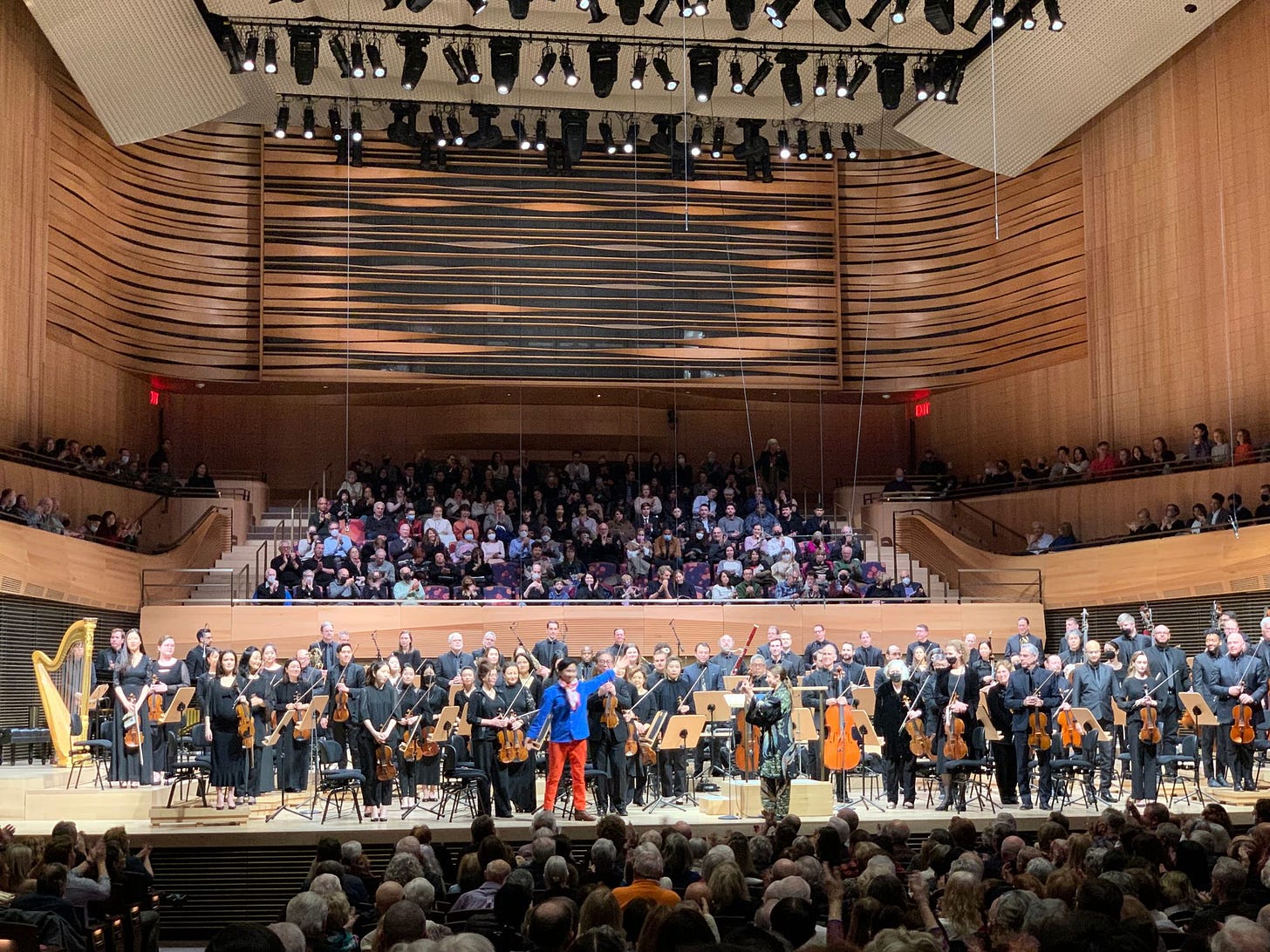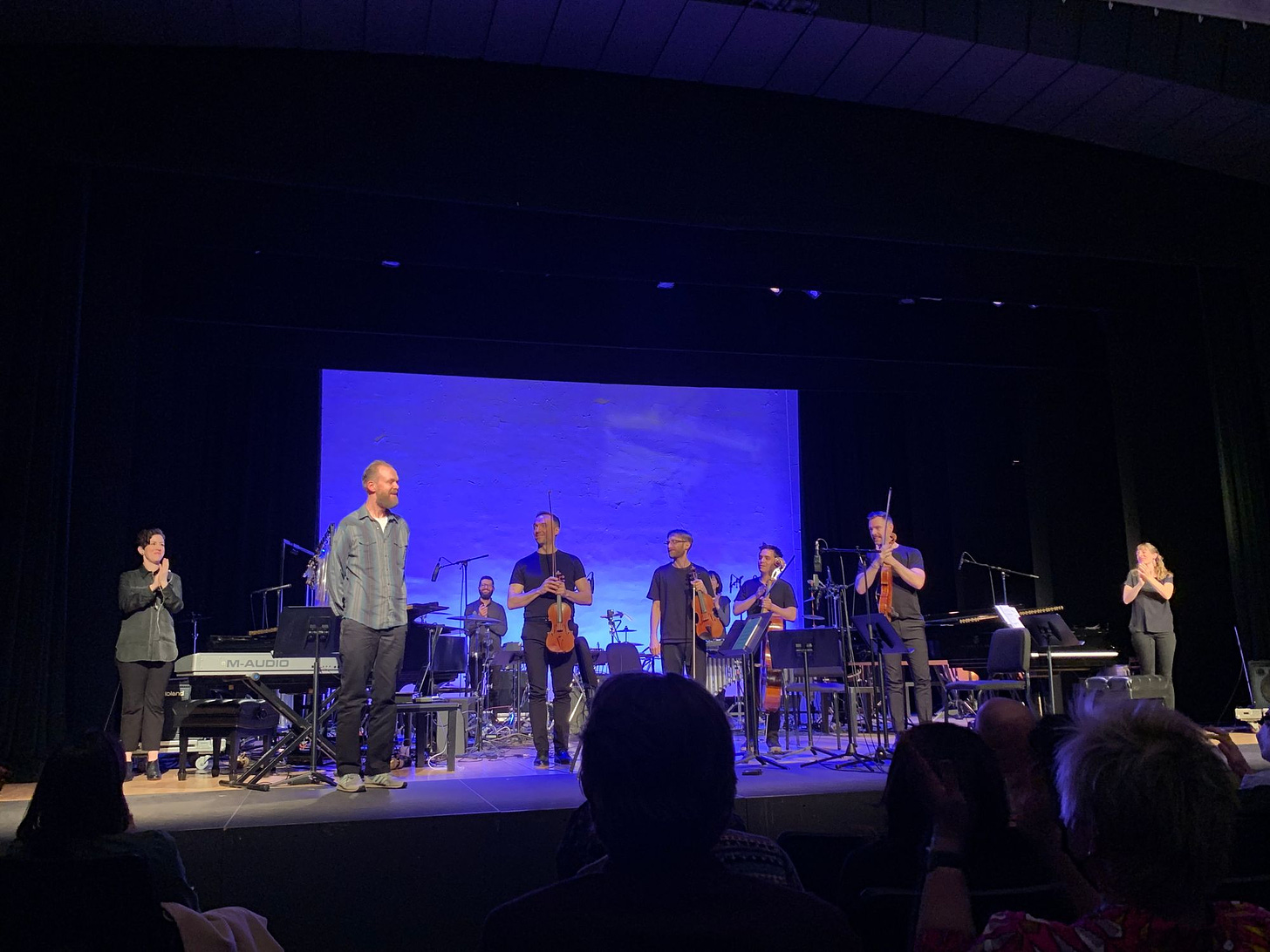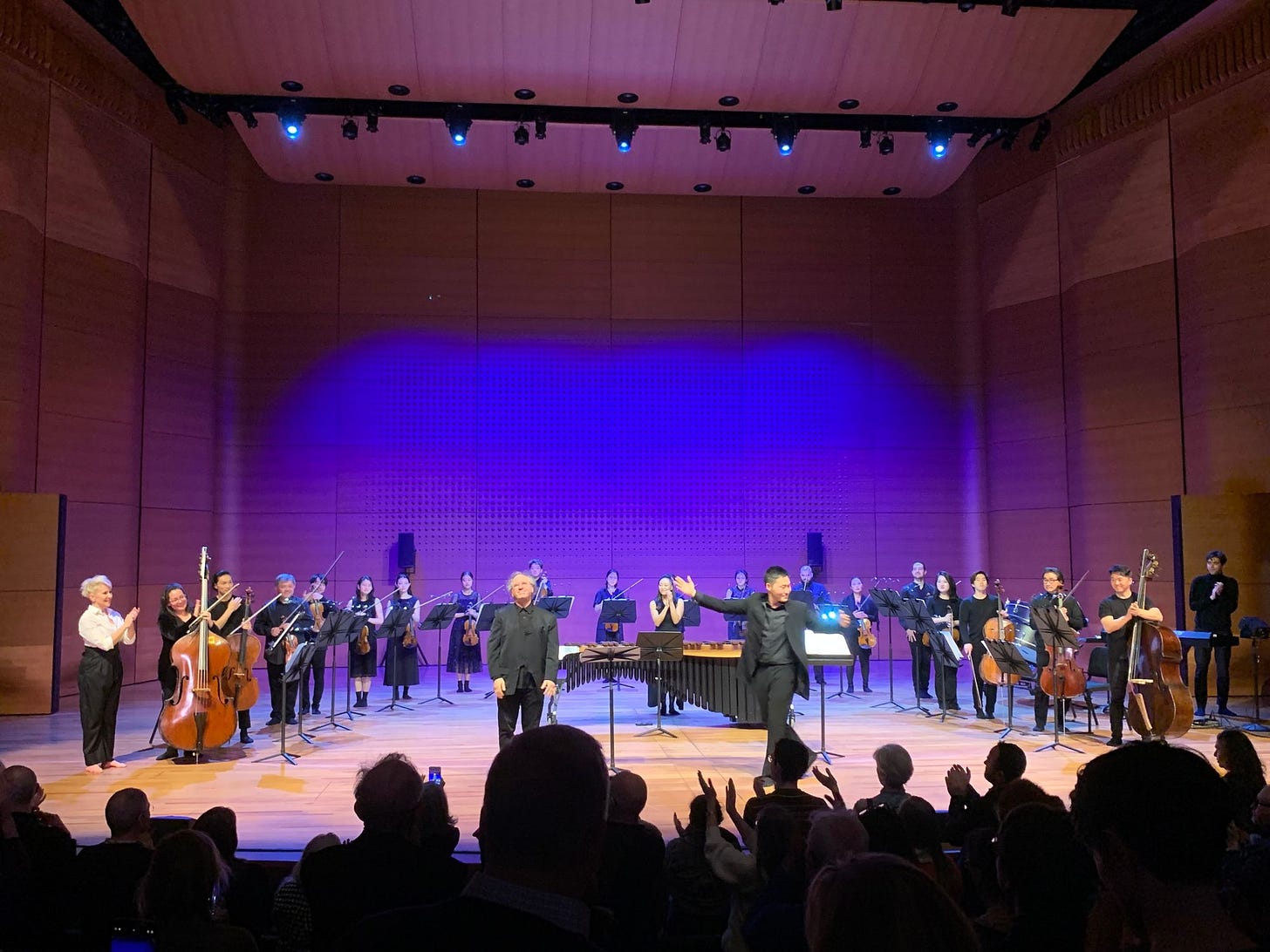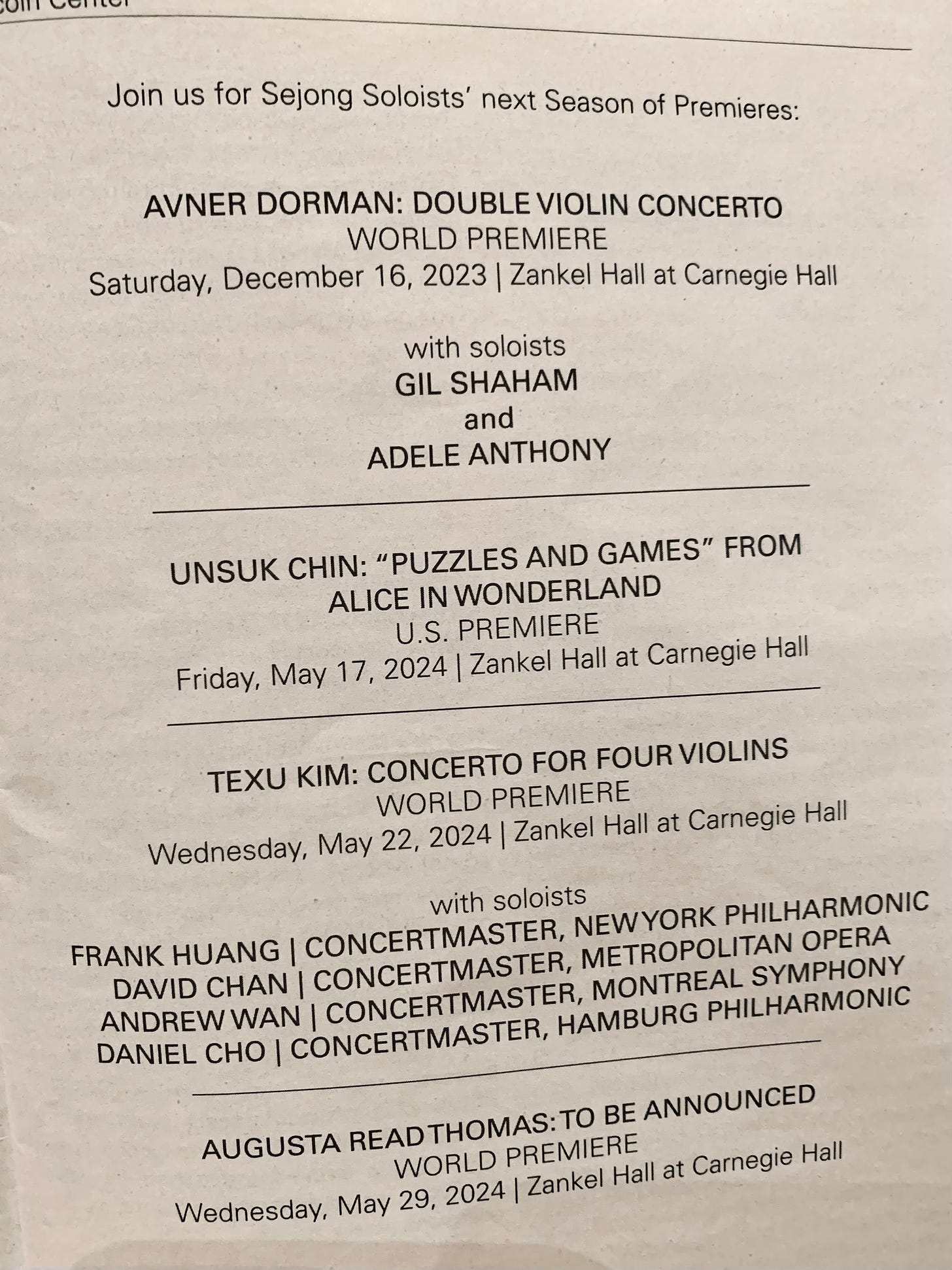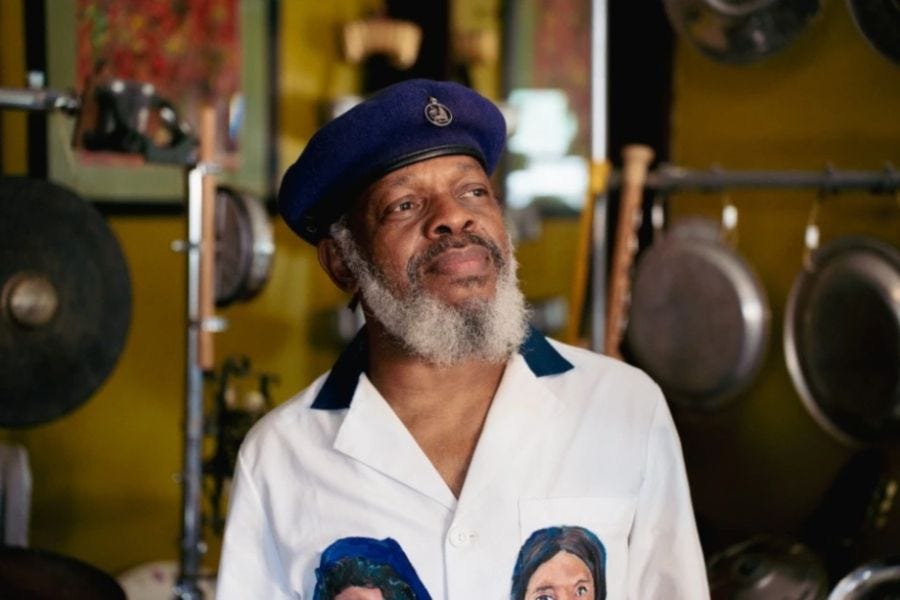Starting over.
Rumbling back into action with accounts of recent concerts, a video from Joanna Mattrey, and listings for upcoming concerts of note.
The year got off to a difficult start, for reasons not worth recounting. As a result, I attended shockingly few events during January and February, completely missing events widely heralded (even by me) like Studio Rivbea Revisited, Winter Jazzfest, Prototype, and John Zorn's tribute to Derek Bailey at Roulette.
That's not to say I heard nothing at all, or even nothing new. The New York Philharmonic – to which I turned repeatedly for comfort – offered a surprisingly robust series of new and recent pieces. Might this be because New York City is now chock full of adventurous arts offerings during January? Maybe.
Whatever the cause, it was gratifying to hear Magnus Lindberg's Piano Concerto (with soloist Yuja Wang), Anna Thorvaldsdottir's Catamorphosis, Wang Lu's Surge, and Esa-Pekka Salonen's Kínēma (featuring NY Phil principal clarinetist Anthony McGill) – and Thomas Adès's 2008 piece In Seven Days, with pianist Kirill Gerstein – on Philharmonic programs during January and February.
I've tended in recent seasons not to write much about the consistently engaging Composer Portraits series at Columbia University's Miller Theatre, since I have a personal connection to those presentations. That said, I greatly enjoyed getting to know more music by the versatile, cheeky Norwegian composer Øyvind Torvund as played by Yarn/Wire, JACK Quartet, and a handful of companions on March 2.
Among the many influences you might cite, I heard what felt like the direct impact of John Zorn's file-card pieces from the late '80s, and, by extension, Carl Stalling. I don't know that I'd ever previously heard a concert-music composer make such convincing use of sounds from the noise-music world—a borrowing amplified, rather than diminished, by modest volume. Combining Yarn/Wire and JACK proved visionary; I hope more composers might find opportunity to deploy the mingled "JACKwire" ensemble.
Also, if I might say so, the program notes by Lara Pellegrinelli are superb. (Full disclosure: my wife, you know.)
One more encounter of real stature and substance came last Tuesday, March 7, when mezzo-soprano Joyce DiDonato joined the string ensemble Sejong Soloists in the world premiere of Overstory Overture, the newest operatic work by Tod Machover, at Lincoln Center's Alice Tully Hall. I've always admired Machover's ingenious electroacoustic works, including his operas—especially Death and the Powers, a 2010 one-act with a libretto by Robert Pinsky.
DiDonato, among the most charismatic and compelling artists currently working in opera, has shared a connection with Machover ever since she appeared in Resurrection, his 1999 Tolstoy adaptation, at Houston Grand Opera. That she also considers herself an activist, in deed as well as in word, made Overstory Overture a fitting sequel to her own recent exercise in seed-planting, Eden.
The half-hour monodrama, derived from a novel by Richard Powers, introduces Patricia Westerford, a scientist whose career suffered in the wake of her insistence that trees communicate with one another. The piece is meant to stand alone, while also serving as the first glimpse of a larger opera based on the novel. Previewing the opera and its creators for The New York Times, Thomas May writes insightfully about Machover, DiDonato, Powers, and how they came together.
The opera wasn't staged, precisely, but its participants were smartly directed by choreographer Karole Armitage, who made subtle but effective use of the Sejong string players and conductor Earl Lee. Two more musicians lent extra drama to the sonic landscape: Ji Hye Jung, on marimba and bass drum, and Albert Cano Smit, on digital sampler. Ben Bloomberg's sound design and Peter Torpey's lighting created a vivid impact with relatively economical resources.
DiDonato was a characteristically intense presence, singing beautifully and trenchantly in soaring high notes and robust low ones. (I'd have appreciated projected titles; text from Simon Robson's libretto was provided in the program, but following it would have meant looking away from the stage.)
Two formal reviews have appeared, both filled with insights. A Musical America account by David Patrick Stearns is behind a paywall, but you can read the text on Machover's Facebook page. A second review, by Anne E. Johnson, is accessible to all on Classical Voice North America, the online publication of the Music Critics Association of North America.
It was a privilege and a pleasure to witness the new work's birth; I look forward to seeing how it grows outward and upward. I also admired the concert's first half: an Adagio by Michael Haydn; the Violin Concerto in D minor (not the famous one in E minor) by Felix Mendelssohn, with Stephen Kim as the poised soloist; and Anton Webern's early, sumptuous Langsamer Satz.
That's the kind of fare I'd always associated with Sejong, listings for whose concerts I used to write regularly for Time Out New York. But the ensemble also presents a steady stream of recent and new pieces, some of which – including the Machover mini-opera – it commissions. A page from last week's program detailed upcoming U.S. and world premieres from Avner Dorman, Unsuk Chin, Texu Kim, and Augusta Read Thomas. It's mighty impressive.
Playlist.
The latest tally of memorable things that got stuck in my ears includes Marc Ducret shredding in the music of Tim Berne, the Iceland Symphony Orchestra offering a stunner of a program, an instantly absorbing space flight from space-music veteran Chuck van Zyl, and a knotty double header for piano and percussion from Matt Mitchell. Details here.
Video of the week.
Last Saturday night, improvising violist and composer Joanna Mattrey presented the second major project of her current Roulette residency. For Arrhythmia, Mattrey formed a powerful ensemble by combining two potent duos: her own with violinist gabby fluke-mogul (heard on Oracle, released in November), and that of saxophonist Patrick Shiroishi and trumpeter Chris Williams (documented on the May 2001 release Sans Soleil and its October 2022 sequel). All four are adept at long-lined melodies and textural gestures; Mattrey takes advantage of both options.
Watching the performance, in which the players sit around a pillar of video screens, with the audience surrounding them, suggests that some details and effects likely eluded the camera. Even so, it's good to be able to see and hear this project, thanks to Roulette's unusually generous video documentation. (The performance starts right around 11:50 into the video.)
Night After Night Watch.
Concerts listed in Eastern Standard Time.
David First + David Watson & Sam Kulik
Shift
411 Kent Ave., Brooklyn
Wednesday, March 15 at 8pm; $15
withfriends.co
Composer and multi-instrumentalist David First has been on a tear during recent years, producing a head-spinning breadth of work for solo instuments and ensembles alike. He'll be playing unaccompanied acoustic guitar here, as he did to dramatic effect on his 2016 solo LP Same Animal, Different Cages Vol. 1: Études for Acoustic Guitar. Bagpiper and Shift director David Watson shares the bill, performing with Western Massachusetts maverick Sam Kulik.
American Composers Orchestra
Zankel Hall, Carnegie Hall
881 Seventh Ave., midtown Manhattan
Thursday, March 16 at 7:30pm; $40, $50
carnegiehall.org
Daniela Candillari conducts the world premiere of Modern Yesterdays, a cycle of songs by guitarist Kaki King newly orchestrated by DJ Sparr, and Materia Prima by Carlos Bandera, as well as the first New York performance of Ellen Reid's Floodplain. Raising the curtain is Fate Now Conquers, a stirring Carlos Simon work inspired by Beethoven; more on the program here.
Peter Evans: Being and Becoming
Roulette
509 Atlantic Ave., Brooklyn
Thursday, March 16 at 8pm; $30, advance $25, seniors and students $20
roulette.org
Peter Evans, a trumpeter of supernatural facility and razor-sharp reflexes, presents music newly composed for his Being and Becoming quartet featuring vibraphonist Joel Ross, bassist Nick Jozwiak, and drummer Michael Ode. If you can't attend, the show will stream live on the Roulette website, and then will remain available afterward for on-demand viewing.
International Contemporary Ensemble
Chelsea Factory
547 W. 26th St., Chelsea
Friday, March 17, and Saturday, March 18 at 7:30pm; $20, partial view $15
chelseafactory.org
An intrepid handful of players from the International Contemporary Ensemble ranks – bassoonist Rebekah Heller, violist Wendy Richman, cellist Aliya Ultan, and percussionists Nathan Davis and Clara Warnaar – join the visionary composer, improvising saxophonist, instrument builder, and multimedia artist Douglas R. Ewart in a program of original works. George Lewis, the ensemble's artistic director and like Ewart a longtime associate of Chicago's Association for the Advancement of Creative Musicians (A.A.C.M.), leads a discussion with Ewart on Friday night.
thingNY + Aaron Siegel
The Brick
579 Metropolitan Ave., Brooklyn
Sunday, March 19 at 8pm; $15–$25
bricktheater.com
The unpredictable performance-art cabal thingNY, who kept us all company throughout the long, lonely quarantine months with quirky, affecting operas delivered online and by snail mail, is back in IRL action with You Against Nature, a new opera the group commissioned from fellow renegade Joseph White. Sharing the bill is Your People Saying Hello, the latest iteration of an ongoing project by composer, percusionist, and Experiments in Opera executive director Aaron Siegel.
Find more listings in Night After Night Watch: The Master List, available exclusively to paid subscribers.
Life goes on.
(Photographs by the author, except where indicated otherwise.)
